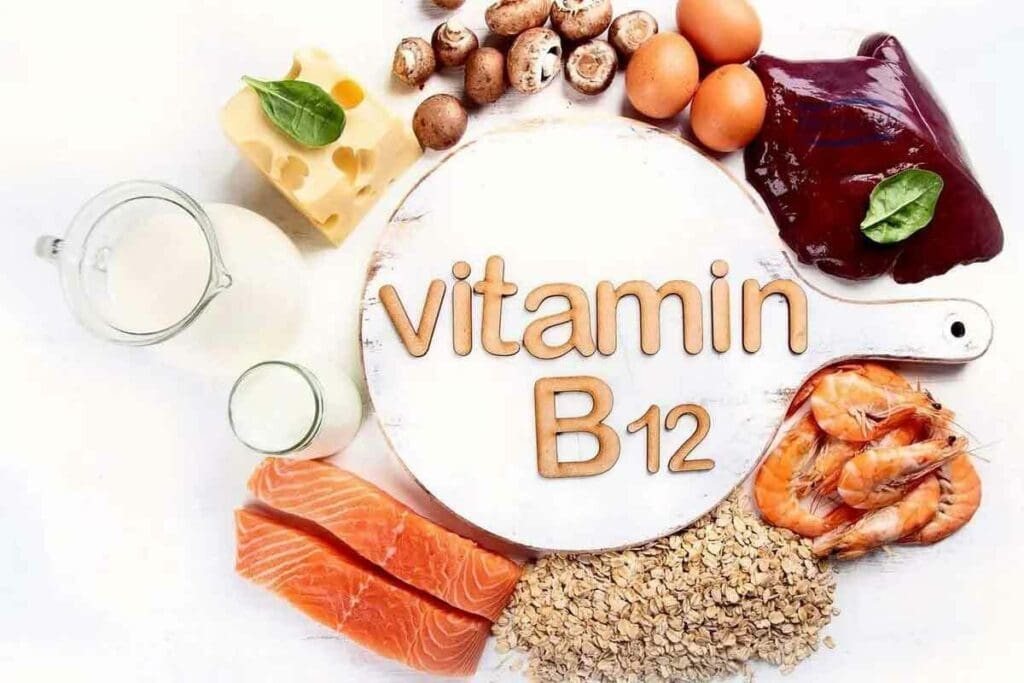Last Updated on November 17, 2025 by Ugurkan Demir

Do you often feel tired, forgetful, or weak without reason? These signs might point to a bigger problem, like a lack of folate or vitamin B12. If not treated, these issues can cause serious health problems, like anemia and nerve damage.
At Liv Hospital, we know how critical it is to find and fix these problems right away. Our team is all about caring for you, using the latest lab tests to spot and treat these issues.
It’s key to know the signs of these deficiencies to stay healthy. In this piece, we’ll look at seven important signs to watch for. We’ll also talk about why checking your folate and vitamin B12 levels is so important.

Folate and vitamin B12 are key nutrients for making red blood cells and keeping the nervous system healthy. They are vital for many body functions. Not having enough can cause serious health problems.
Folate, or vitamin B9, is essential for DNA synthesis and repair. It helps make red blood cells, preventing anemia. It’s also important for cell metabolism and making some amino acids.
During pregnancy, folate is very important. It helps prevent neural tube defects in the baby. Adequate folate levels also lower the risk of some cancers and heart diseases.
Vitamin B12 is needed for making red blood cells and keeping the nervous system working. It helps make myelin, the fatty substance around nerve fibers. This helps nerve impulses move.
Vitamin B12 also helps with fatty acid and amino acid metabolism. Not having enough can cause nerve problems like numbness and weakness. It can also affect thinking and memory.

It’s important to know how B12, folate, and iron work together. These nutrients help make red blood cells, DNA, and keep our nerves working right.
Vitamin B12 and folate are closely linked. They help make DNA and break down fats and proteins. If you don’t have enough B12, folate can’t do its job, showing how they depend on each other.
Iron is also connected to B12 and folate. It’s key for making hemoglobin, which carries oxygen. Not having enough B12 or folate can cause big red blood cells. Iron deficiency makes red blood cells small.
Deficiencies in B12, folate, and iron often happen together. This is because they share risk factors and work together in the body. Diet, health conditions, and some medicines can cause all three to be low.
Not eating enough animal products can lead to B12 deficiency. Not getting enough folate from leafy greens and fortified cereals is another cause. Iron deficiency can come from not eating enough iron, losing blood, or needing more during pregnancy.
“The diagnosis of anemia requires a thorough look at B12, folate, and iron metabolism.”
— Expert Opinion
The table below shows how B12, folate, and iron are connected:
| Nutrient | Primary Role | Deficiency Consequence |
| Vitamin B12 | DNA synthesis, neurological function | Megaloblastic anemia, neurological damage |
| Folate | DNA synthesis, red blood cell production | Megaloblastic anemia |
| Iron | Hemoglobin production, oxygen transport | Microcytic anemia, fatigue, weakness |
Healthcare providers need to understand these connections to treat deficiencies well. Knowing the signs of B12, folate, and iron deficiency helps us help our patients better.
It’s important to know the signs of low folate and vitamin B12 deficiency early. These issues can cause health problems, from mild to severe. We’ll look at the main signs that show you might not have enough of these important nutrients.
Fatigue and weakness are common signs of low folate and vitamin B12. These nutrients help make red blood cells, which carry oxygen. Without enough, your cells don’t get enough oxygen, making you feel tired and weak.
A lack of folate and vitamin B12 can also make your skin look pale or jaundiced. This happens because your body makes fewer red blood cells and breaks down the ones it has. This leads to a buildup of bilirubin, turning your skin yellow.
Problems with thinking and memory are also signs of deficiency. Vitamin B12 helps make myelin, a fatty substance around nerve fibers. Without enough, you might have trouble concentrating and remembering things.
The feeling of pins and needles, or paresthesia, is a sign of vitamin B12 deficiency. It happens when your nervous system is damaged, causing abnormal sensations.
Other important signs include:
Knowing these signs is key to catching and treating the problem early. Here’s a table that shows the signs and what might cause them:
| Signs | Potential Cause |
| Fatigue and Weakness | Reduced red blood cell production |
| Pale or Jaundiced Skin | Breakdown of red blood cells |
| Cognitive Changes | Nerve damage due to B12 deficiency |
| Pins and Needles Sensation | Nerve damage |
It’s key to know how lab tests work to spot low folate and B12 levels. These tests measure folate and B12 in your blood. This is how doctors find out if you’re lacking these important nutrients.
A B12 level under 200 pg/mL is usually seen as low. Vitamin B12 deficiency can cause tiredness, weakness, and brain problems. We’ll look into what low B12 means and how doctors check for it.
For more info on B12 and folate tests, check out Pathology Tests Explained.
Folate levels are measured in nanograms per milliliter (ng/mL). Low folate can make you feel tired, look pale, and affect your thinking. Knowing what’s normal and what’s low is important for finding and fixing the problem.
| Nutrient | Normal Range | Deficiency Threshold |
| Vitamin B12 | 200-900 pg/mL | Below 200 pg/mL |
| Folate | 2.7-17.0 ng/mL | Below 2.7 ng/mL |
Understanding these levels takes a deep look at your health and lab results. Always talk to a doctor to get the most out of your test results.
It’s important to know the difference between low folate and vitamin B12 deficiency. Both can cause symptoms like fatigue and weakness. But they affect health in different ways.
Folate and vitamin B12 are key for making red blood cells and keeping the nervous system healthy. Their deficiencies show up differently because of their unique roles.
Vitamin B12 deficiency often causes neurological symptoms. This is because it’s vital for making myelin, the fatty substance around nerve fibers. Symptoms include:
Experts at the University of Chicago’s Pritzker School of Medicine say vitamin B12 is key for the nervous system. Without it, neurological problems can get severe.
Folate deficiency mainly shows up as anemia. Signs include:
A study on DVC Stem shows folate’s role in preventing megaloblastic anemia. This is a condition where red blood cells are too big.
Here’s a table summarizing the main differences:
| Symptom | Low Folate | Vitamin B12 Deficiency |
| Anemia | Common | Common |
| Neurological Symptoms | Rare | Common |
| Fatigue and Weakness | Present | Present |
In conclusion, low folate and vitamin B12 deficiency share some symptoms. But they have unique features that need careful diagnosis and treatment. Knowing these differences helps healthcare providers give better care.
Many factors can lead to folate and vitamin B12 deficiency. Knowing these causes helps in preventing and managing the issue.
Diet is key in developing folate and vitamin B12 deficiencies. Not getting enough folate from foods like leafy greens and legumes can cause deficiency. Also, not eating enough animal products can lead to vitamin B12 deficiency, as it’s mainly found in animal foods.
Some medical conditions can make it hard for the body to absorb folate and vitamin B12. For example, gastrointestinal disorders like celiac disease and Crohn’s disease can damage the intestine’s nutrient-absorbing parts.
Some medications can affect folate and vitamin B12 levels. For instance, proton pump inhibitors (PPIs) used for acid reflux can reduce vitamin B12 absorption over time.
Understanding these causes and risk factors helps us identify who’s at risk. We can then take steps to prevent or treat the issue.
It’s important to know about folate deficiency in different groups. This helps us create better health plans. Some groups face higher risks due to their diet, health, or economic status.
In the UK and US, folate deficiency is a big health worry. Research shows some groups are more likely to have low folate levels. For example, a study on the National Center for Biotechnology Information website talks about this issue in different groups.
The UK’s National Health Service (NHS) says folate deficiency is common in pregnant women and those with special diets. In the US, the Centers for Disease Control and Prevention (CDC) also see folate deficiency as a problem. They focus on low-income people and those who can’t get to healthy foods.
Some groups are more likely to have folate deficiency. These include:
Folate deficiency is a big problem worldwide. The World Health Organization (WHO) says it’s a main cause of anaemia globally. How common folate anaemia is varies by country and group. It depends on diet, healthcare, and money status.
Knowing how widespread folate anaemia is helps us make better health plans. By focusing on high-risk groups and creating special programs, we can fight folate deficiency worldwide.
If folate and vitamin B12 deficiencies are not treated, they can cause serious health problems. These issues can affect many parts of the body. This leads to severe health issues.
Untreated folate and vitamin B12 deficiencies can lead to megaloblastic anemia. This condition makes red blood cells too big. These cells can’t work right.
Symptoms of megaloblastic anemia include:
Vitamin B12 deficiency can also cause neurological damage. This can lead to numbness or tingling in hands and feet. It can also cause trouble walking and changes in thinking.
The neurological effects can be irreversible if left untreated for too long.
Untreated folate and vitamin B12 deficiencies can have serious long-term effects. These include a higher risk of heart disease and problems during pregnancy. There’s also a risk of permanent neurological damage.
| Complication | Description | Potential Consequences |
| Megaloblastic Anemia | Production of abnormally large red blood cells | Fatigue, shortness of breath, pale skin |
| Neurological Damage | Numbness, tingling, difficulty walking | Irreversible damage if untreated |
| Cardiovascular Disease | Increased risk due to deficiency | Heart attacks, strokes |
Knowing the signs of low folate and vitamin B12 deficiency is key to avoiding serious health issues. This article has covered how folate and vitamin B12 work together and the problems caused by not having enough. We’ve seen how important they are for our health.
We’ve talked about the signs of not having enough folate and vitamin B12, like feeling tired, changes in thinking, and nerve damage. Testing and understanding folate and B12 levels is critical for finding out if you’re deficient. Knowing what can cause these problems helps prevent them.
In short, it’s vital to keep folate and vitamin B12 levels right for good health. By knowing the signs and taking action, we can avoid serious health problems linked to low folate and vitamin B12.
Symptoms include fatigue, weakness, and pale skin. You might also feel a pins and needles sensation. These signs can look the same for both deficiencies, making it hard to tell without a blood test.
Blood tests check folate and vitamin B12 levels. Places like Cleveland Clinic and Johns Hopkins Medicine offer these tests. The results help figure out if you’re deficient and what to do next.
A low B12 number is below 200 pg/mL. Levels between 200-300 pg/mL might need more testing. This is to confirm if you’re really deficient.
Yes, eating right can help. Foods like leafy greens and animal products are good sources. Sometimes, supplements are needed, like for people with certain health issues.
Untreated, these deficiencies can cause serious problems. They can lead to anemia and damage to your nervous system. Healthline and MedlinePlus have more on these risks and how to manage them.
Yes, some groups are more at risk. This includes pregnant women and people with celiac disease. In some places, not having access to good food sources also increases the risk.
Certain conditions, like celiac disease, can make it hard to absorb these nutrients. Some medicines can also affect absorption. This is why managing these conditions is so important.
You can find reliable info at places like MD Anderson and the University of Chicago. Health websites like Bioinformant also have helpful information. They offer the latest on diagnosis and treatment.
https://www.nhs.uk/conditions/vitamin-b12-or-folate-deficiency-anaemia/treatment
Subscribe to our e-newsletter to stay informed about the latest innovations in the world of health and exclusive offers!